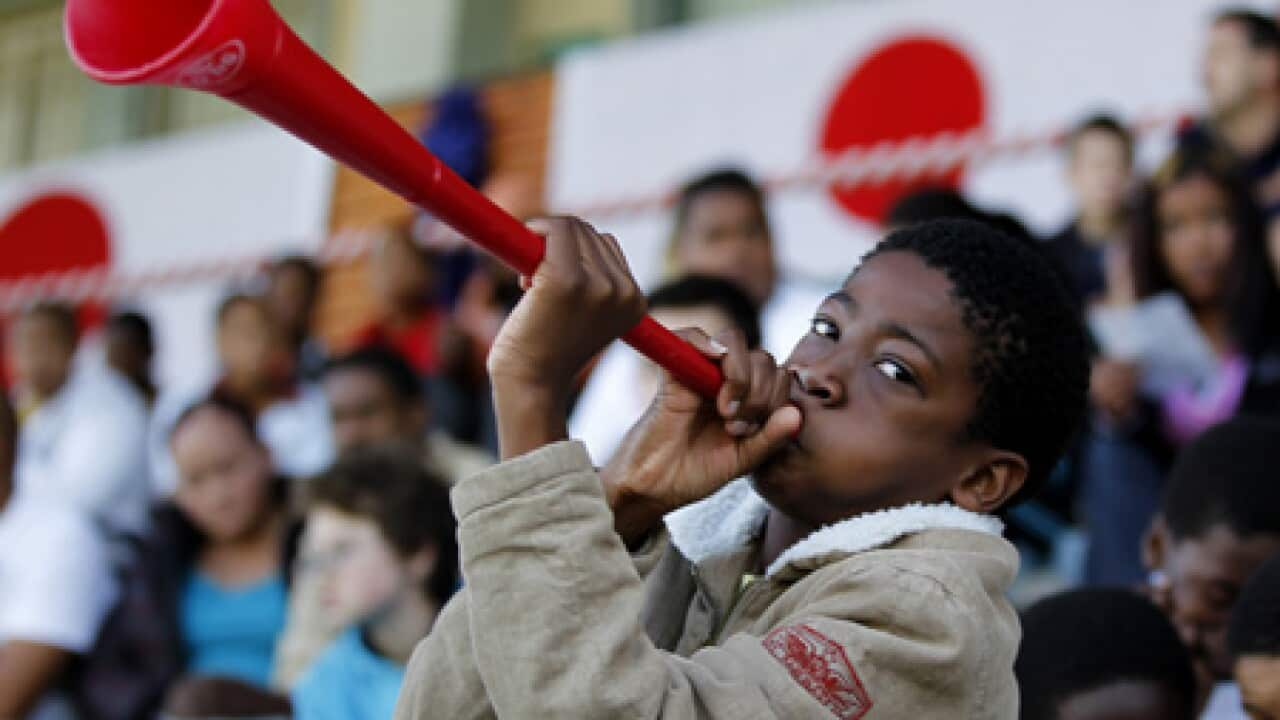The journey of the Plastic Horn in South Africa has been a rocky one.
In January a South African Church Group tried to have it banned. The Shembe Church, believed to one of Africa's oldest churches uses a similar horn to the vuvuzela in their yearly pilgrimage to the peak of Mount Nhlangakazi north of Durban.
The Shembe followers see it as a direct line of communication between themselves and God and do not appreciate the use of it for such things as football.
"Football is stealing pleasure from Shembe," an elderly follower told the BBC in January.
Despite the complaints from Church groups the plans went ahead for the unveiling at the Confederations Cup tournament last year in South Africa.
Organising committee spokesman Rich Mkhondo defends the horns as cultural and hopes for it to be embraced as part of the South African culture.
“You find that they emanate from the horn which was used by our forefathers to call meetings," he said. "As our guests, please embrace our culture; please embrace the way we celebrate.
"You either love them or you hate them. We in South Africa love them."
Mkhondo said the vuvuzela was now an international instrument, and visitors were "stuffing them into their suitcase" before going home from the World Cup.
Vuvuzela becomes World Cup Souvenir
England defender Jamie Carragher said he's been asked to take some back.
"My kids have been on the phone and they want two. I've got two in my bag already," Carragher said.
South African fans have taken to the horn, with every stadium awash with the sound of what some describe as an angry swarm of bees invading the stadium.
"It's our way to motivate players, to express happiness and how do you feel in the stadium," 23-year-old Sazi Mhlwatika” told AFP
"We are used to them and you can't enjoy the game without vuvuzelas. If there's no vuvuzelas, there is no game. It's just a traditional thing in South Africa. Abroad, they sing from the first minute to the end, here we blow vuvuzelas from the beginning to the end."
SBS blogs debate vuvuzela
Despite the enthusiasm of host supporters many fans watching around the world on television don't share the sentiment. In the few days since the World Cup kicked off SBS blogs have been flooded with complaints about the noise of the plastic trumpet.
“If not for the background noise we would be watching many more games.” One comment said.
Whilst other comment believes ratings will suffer as a result of the sound made by the vuvuzela.
“Those vuvuzelas have got to go - it's no fun watching the game in silence, so I'm not watching it at all - as are a lot of other people I know. Why FIFA doesn't put a ban on them is beyond my comprehension. Those awful instruments will cost FIFA a lot of money over the coming weeks as the ratings will inevitably show.” One fan wrote.
American Columnist Kevin Blackistone has taken a different approach to the debate damning the complaints from overseas viewers as 'cultural imperialism.'
“This may be the World Cup, but it is Africa's World Cup just like over half of the previous 18 were Europe's. Taking away the vuvuzela would be nothing short of another page of cultural imperialism exercised by Europe on Africa.” Blackistone said on sports website fanhouse.com.
BBC may have solution for British viewers
The BBC received 545 complaints from viewers after only four days of competition with the British broadcaster now attempting to mute ambient sound in there broadcasts and making it available to viewers through use of their 'red button' service.
Aside from what happens with broadcasters, players themselves are finding it difficult to cope under the noisy conditions.
Dutch coach Bert van Marwijk has even banned supporters from using them at Dutch training sessions.
While van Marwijk's star striker Robin van Persie has been blaming vuvuzelas on his inability to hear the referee's whistle, a notion backed up by Spanish midfielder Xabi Alonso at last years confederations cup.
"I think they should be banned. They make it very difficult for the players to communicate with each other and to concentrate," The Real Madrid player said last year.
While fellow Real Madrid star Portugals Cristiano Ronaldo feels that players should just get used to it.
"It is difficult for anyone on the pitch to concentrate," the Portuguese captain told a press conference.
"A lot of players don't like them, but they are going to have to get used to them. Hardly anyone likes them, but the people who do like them are those who like to blow the instruments and make a racket."
Fans seethe others see dollar signs
As some fans seethe over the sound coming through their TV speakers others have seen the opportunity as a business venture.
Over one million people have already downloaded an iPhone application that has the all too familiar sound of the vuvuzela blaring from its speakers, while one website is promoting an "Anti Vuvuzela Filter."
The filter promises to silence the sound of the controversial trumpet that has become the trademark of South Africa's World Cup.
But speaking with AAP Anthony Sullivan, a physicist at South Africa's Rhodes University, has called the filter idea as "a marketing hype and a waste of money."
"Noise cancelling depends on specific positions. You're not going to get that cancelling," he said.
Regardless of the debate, they will not be banned. Sepp Blatter FIFA president has used twitter to defend the plastic horn which has caused so much debate.
"I don't see banning the music traditions of fans in their own country. Would you want to see a ban on the fan traditions in your country?" Blatter wrote.
As the World Cup progresses the most vocal element from the crowd may not be the English songs, or the South Korean cheers, but the noise emitted from a small plastic horn.
Share

